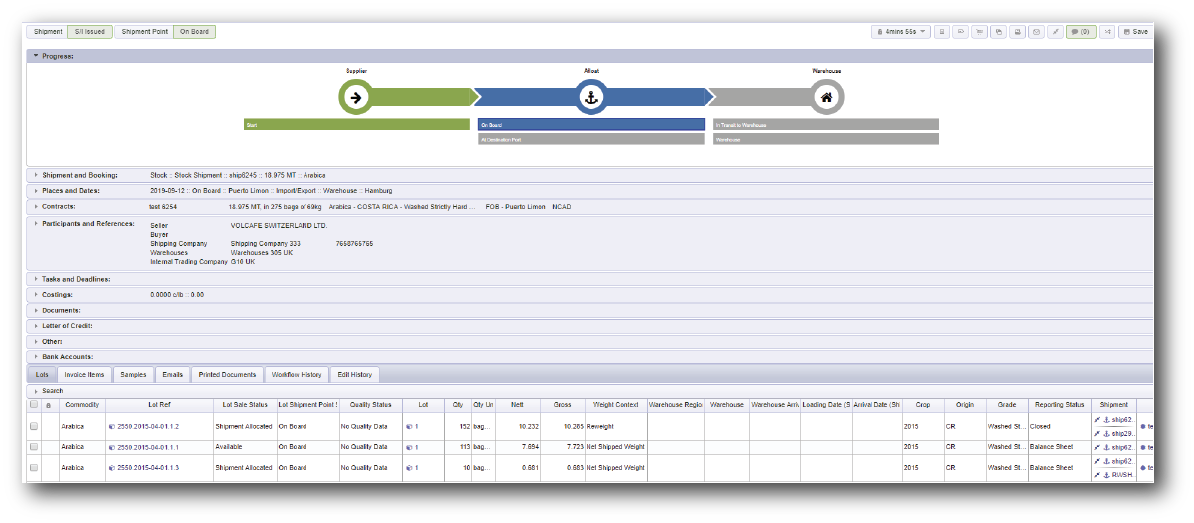A modern commodity management system not only helps ensure each trade is correct and the associated instructions are accurate. It also distributes data across the company so that everyone has real-time access to the latest information and knows when it’s time for their area of responsibility and expertise to step in.
One reason why it has been hard to digitalise commodities in the past is that we have so many small and very important details that need to be right for a company to capture the full P&L potential of each trade. The expertise of trading, operations, shipping, finance and other professionals is always needed if we are to capitalise on the opportunities presented by these small but essential details.
Like the common Pareto principle, or 80/20 rule, which finds that time and again, 80% of your results are driven by 20% of your efforts, the incremental improvements a skilled operator makes can be the difference between a profitable trade and a costly mistake. Our apps specialise in helping you make information-sharing, workflows and document creation (with all the right reference details), faster. These apps make that initial 80% easier than ever before by automating your standard processes and saving your teams from re-typing and copying information. You, however, still need to add your know-how to capture the maximum profit; the 20% that will make the biggest difference.
Below we will talk about what you can add to your Gen10 documents, where you can automate tasks and what that will mean for your business:
Trading
Automate trade confirmations and contracts from a wide range of draft document starting points. Choose between a blank sheet, pre-approved template or a copy of a previous trade to save time and create your documents in the most intuitive way. Automatically populate your documents, carry out any weight or currency conversions and send documents and instructions on to operations, finance, or legal teams for processing.
Remove the need to generate P&L reports with the Live feed P&L; pre-populated with cost estimates, including with currency and other conversions as standard. And because your P&L updates in real-time as you make changes to a contract, you can carry out quick and easy what-if analysis to get better results from your trades.
The pre-trade checks mean that any issues are raised before you invest time and effort on a deal that will not be approved further down the line. Check finance and insurance lines to immediately know whether these are pre-approved, without needing to speak to finance teams or wait for end-of-day reports. Check that your KYC is in order based on pre-approvals and system rules, including any sustainability and traceability documentation, and automatically send contracts to internal teams for approval or counterparties for signature when they are ready.
Operations
Operations benefit from having the contract, deal and initial cost estimates clean and complete. This in itself saves vast amounts of time, from the logistics planning process through to accurate documentation and invoicing/payment terms. All draft instruction documents are pre-populated with the right reference numbers and key information. The information is taken directly from what has been input by the traders, meaning fewer copying mistakes and a clear audit trail if things do go wrong.

For example, a bank release created in Gen10’s Commodity Manager will pre-populate the bank’s reference number, your reference number, the cargo and warehouse details and release text. You can review this information and add or edit any instructions before printing the document or emailing it directly from the system.
Automating administration means documents can be generated in under 10 seconds, saving you a significant amount of time for other, more important tasks that add greater profitability such as optimising freight strategies.
Finance
Taking a proactive approach to your operating and risk policies, workflows, checks and balances helps to automate and streamline many of the day-to-day items that would otherwise distract finance teams from higher value tasks. Reduce time spent answering enquiries and approving documents by pre-approving credit limits and insurance lines. Because all teams have permissions-driven access to real-time position reports that change throughout the day, they can operate with less risk, and are alerted if they attempt to take an action that will breach your financial controls. All without needing to involve your finance team in day-to-day activities.
Play a proactive role in trading and operations by establishing workflows that involve the finance team where required and automatically notify the relevant users when there are actions to complete. You can also monitor all contracts by status in real-time to ensure that none awaiting your input are overlooked.
Automating information-sharing and creating documents based on this shared information frees all teams from many of their time-consuming administration tasks that are prone to error and do not add value to your operations. By sharing this information, all teams are empowered to Work Better. Together and to focus on those tasks that require real skill and add value to your bottom line.
If you enjoyed this article, you may also be interested in exploring position visibility and optionality in metals as part of our series exploring digital transformation in metals and concentrates.


